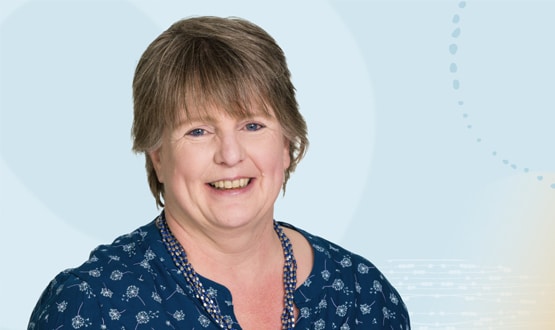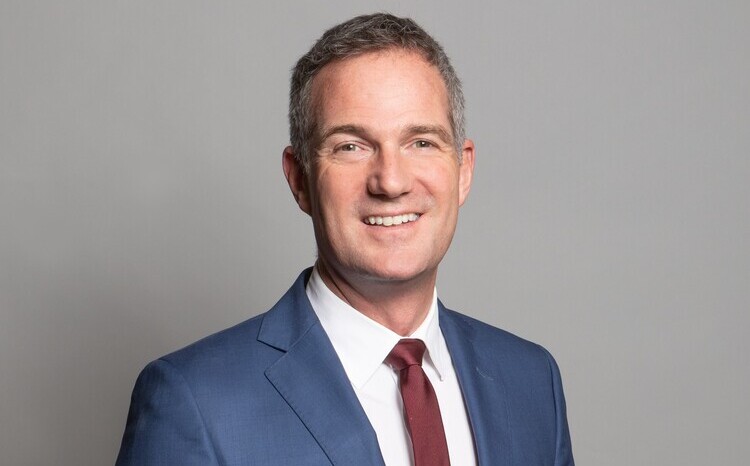With a background in nursing and managing cancer services, Elaine O’Brien understands how hospitals operate. In her current role, she helps clinicians use data to help people be as healthy as possible. By Claire Read
Once Elaine O’Brien qualified as a nurse, she didn’t anticipate that soon her working days would involve detailed conversations about building standards. But as a manager in cancer services in the early 2000s, a period in which the New Labour government focused attention and funding on improving cancer care, it became inevitable.
“I had a lot of opportunity to reconfigure old buildings and commission new ones,” says O’Brien. “And I remember thinking: ‘I’m a nurse. What am I doing building a hospital ward?’”
The answer, she quickly realised, was providing crucial clinical expertise with an operational perspective. And when she got involved in setting up a new electronic solution to support the management of the services, she began to understand the value of that.
“I went into it quite naïvely – I didn’t really understand digital services at the time. But I worked very closed with our IT team and learnt a huge amount from them. They didn’t really know clinical services, so my input was valuable to them too.”
It wasn’t the only realisation inspired by the project. Working on the implementation of the system is when O’Brien discovered she really liked data.
“We were putting in the infrastructure around a system that managed patient waiting times, but suddenly the information became available to all of us,” she remembers.
“As a cancer manager I could sit back, look at the data, and go: ‘Oh, okay, there’s a trend here’, or: ‘There’s something happening in this service, we’re managing to get patients through much more quickly here versus over here. Why is that?’
Data-driven dialogue
“Suddenly I was able to see themes and that helped me then engage on a data-driven dialogue with clinicians within those services. So without having realised it when I helped install the system, it was actually a bit of a game changer.”
And ultimately a game changer for her career, too. After a few years working in roles focused on organisational redesign, and then in commissioning, an opportunity came up at Cerner (now Oracle Health).
“They didn’t recruit me because I knew about digital,” O’Brien says. “They recruited me because I knew how services ran. They knew I understood how a hospital operates, how the money flows. They knew I was interested in that transformation part of it – that I understood that if you just work with the digital folk without engaging clinical and operational folk, then you don’t succeed.
“Digital projects are all about people,” she continues. “You have to spend time building relationships and helping people understand the project, allowing them the space to share any fears in such a way that they then feel they can take that next step. Often the push back with a digital project is simply out of fear of the unknown.”
For O’Brien, though, the unknown tends to provoke curiosity – and a desire to understand. It is a characteristic to which she attributes her move into population health management, back in late 2015.
“It was accidental, really. I never plan anything, but I do ask questions. I want to know what’s coming next. I’m always excited about new opportunities. So we were bringing new population health products to the market at that time, and I wanted to find out more.”
It was particularly intriguing because it seemed to echo interests that had emerged earlier in her career.
“When I was working in cancer services, we were trying to stop people coming into hospital unnecessarily. We were thinking about the pathway, about when and why you actually needed to be in hospital and when care could be successfully delivered outside hospital. It allowed people to spend as much time as possible with their families, and it made ill health a much smaller part of their life.
Pushing the boundaries
“If you think about population health management, it’s about how we can push boundaries further. How can we identify a pre-cursor to an illness and intervene before someone becomes ill and needs hospital care?
“It’s the same theme for me [as with my earlier work], and digital allows you to push further, to push the boundaries out all the time. That’s the bit that truly gets me excited.”
Specialising in population health offered a chance to get properly re-acquainted with another passion as well: data.
“I’m interested in helping people to make the best possible use of the data that’s available to them – using the data to help people be as healthy as possible.”
Recently, that has included efforts to identify patients at risk of particular conditions. “For example, we’ve built out algorithms to identify those that might be at risk of atrial fibrillation [in which the heart rate is irregular and can be abnormally fast; left untreated it can increase the risk of conditions such as stroke or heart failure].
“It’s identifying those things that can cause debilitation and therefore cost to the person, their family and to wider society – and intervening early to try to prevent it.”
With developments such as shared care records, and the national plans for data integration, she sees more opportunities than ever for this sort of work. But to capitalise on those chances will, she believes, require a much wider understanding “of what can be done with data”.
O’Brien argues creating that understanding will require a multi-pronged approach. She’d like to see social care become more digitised, and the concept of the CCIO brought across to it – social workers becoming a link between fellow frontline staff and IT departments. At NHS organisations, she hopes CIOs and CCIOs will continue to spread the word.
“I think they have such an important role in educating their non-digital peers – not just clinical, but operational – on the art of the possible with data.
“Data is an asset. Clinical and operational leaders should be thinking about how to use it to full effect.”
Contact Oracle Health:
Website: www.oracle.com/health
Linkedin: Oracle Health
X (formerly known as Twitter): @OracleHealth







